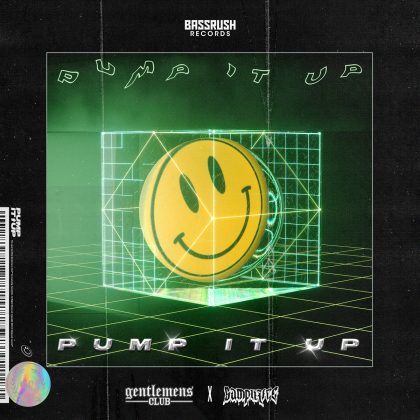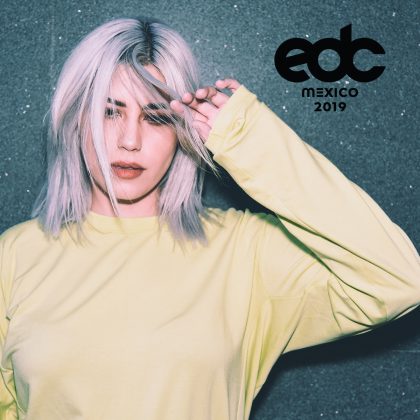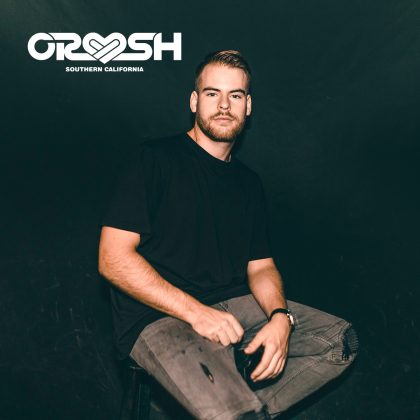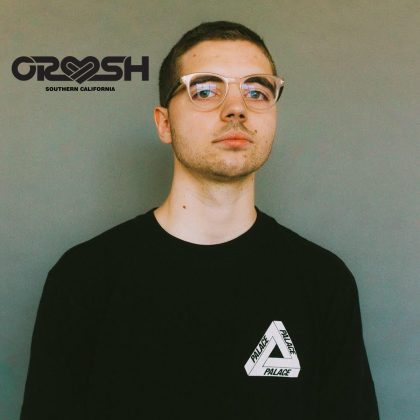How to Talk to Your Kids About Riddim
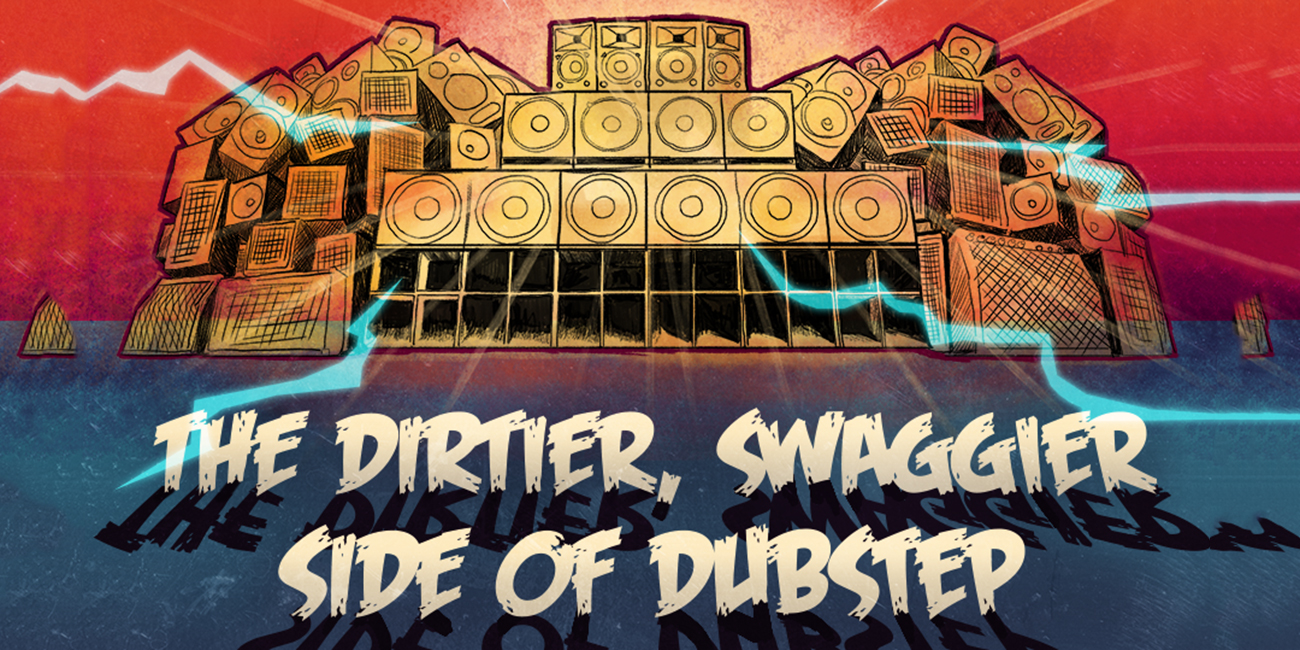
For some it’s a dirty word, and for others, “Riddim is life.” But one thing’s for sure: Nothing gets the heads banging like a proper dirty riddim dropped on the dancefloor. While the Riddim Dubstep Subreddit forum defines the subgenre as “that really bouncy, wonky, swampy, wet, drippy, sometimes repetitive side of dubstep that you can’t help but skank out to,” others feel it’s nothing more than a watered-down version of the kind of early dubstep heads like Jakes were putting out circa 2008/09.
"I think the biggest controversy of all is that riddim isn’t exactly a new sound, but a rebranding of an existing style of minimal dubstep that happened to grow and evolve into what it is today."
Whether you see it as the cutting edge of the underground or a sign of the sell-out apocalypse on the bass music horizon, there’s no denying that riddim is here to stay. The challenge, then, is how to talk about it. Who and what is riddim, and who and what is not? Well, as you’ll soon see, riddim is a slippery term whose very definition is not only difficult to pin down but one that artists and fans are, at times, hesitant to embrace.
For those who love it, it’s considered the dirtier, swaggier side of dubstep—a “simple” style built on loose drum arrangements, percussive triplets, and gnarly basslines. If riddim is your thing, it’s a unique and exciting culture all its own. But from the outside looking in, it can seem repetitive and chaotic, perfect for the headbanging dubstep crew, but a sound that brings with it the taint of appealing to the masses in the worst possible way.
As one well-known dubstep pioneer (who asked to remain anonymous in this discussion) put it, the controversy often begins with the word itself: “Riddim should just be called dubstep.” It’s a sentiment that’s revisited time and time again, as old-school heads resist the claim that riddim is “new” or breaking new ground. For dubstep pioneers and self-proclaimed “purists,” riddim becomes symptomatic of the changing dynamics of a scene where an entirely new generation enters the scene thinking they’ve reinvented dubstep, when in actuality, the sound they heard growing up had already evolved a long way from its roots.
But before we get caught up in the nitty-gritty politics of the term, let’s turn to the streets and see if those actually down in the trenches can help us make sense of the term that everybody loves to hate.
When and where was riddim born?
OOLACILE (producer): As far as I’m aware, Jakes is the man who coined the term “riddim” around 2012 (I may be slightly off on the year). The purpose of this name and this sound was to kind of go back to the roots of what dubstep was, pre-Skrillex era. Artists wanted to capture the same sort of vibe that OG dubstep artists like Skream, DMZ, and Burial had created, while still keeping it modern. Artists like Subfiltronik emerged and really helped establish what riddim is.
What about the word itself—where did it come from?
Kristofer Reinex (founder of Riddim Dubstep Community): The word itself has been adopted from Jamaican dancehall culture. It’s literally the Jamaican patois (slang) pronunciation for the English word “rhythm.” In dancehall and reggae, “riddim” refers to the instrumental accompaniment to a song. Those genres consist of the riddim instrumental, plus the voicing or MCing (vocal part of a song).
How does that history link to how it’s being used in a dubstep context?
Kristofer Reinex: Just as there are dancehall riddims, these are also dubstep riddims. The same concept applies, because it’s the idea that many of these dubstep riddims could easily be voiced over by grime artists. In Europe, it’s actually not uncommon to attend a riddim dubstep event that has an in-house MC delivering bars (lyrics) over the riddims. Considering the commonalities between dancehall riddims and dubstep riddims, it just made that much more sense to me to call it so. Plus, riddim dubstep heavily emphasizes the rhythm of a track. So, you can see why someone would find it fitting to call it “riddim.”
Is it something separate and distinct from dubstep, or should we see it as more of an evolution of the sound?
Anthony Garduño (founder of Get Heavy): I consider riddim a subgenre of dubstep, just like brostep, tearout, drumstep… To me, it sounds like the early stages of dubstep. We used to call it swampy/trenchy back then because of the sounds that were being designed in production.
Kristofer Reinex: If you go back to 2010–11, these were the years where dubstep really took off in the States, especially after the release of Skrillex’s Scary Monsters and Nice Sprites EP. Looking back, you can see it as a turning point in the scene where old-school dubstep began to slowly fade away and a new age of dubstep—what most people call “brostep”—came about. This new era was where you had the screechy synths and large, drawn-out buildups with a heavy emphasis on the drop. This is also when the dubstep community began to evolve into two different directions: In the mainstream, we got brostep; in the underground, we got riddim.
Alfonso from DEFINITIVE (producer): The sound itself is very different from mainstream dubstep, as it’s a lot more on the minimal side and focused on flow and the vibe, more than anything else. In other words, you never really hear riddim producers using heavy melodies, vocals tracks, or crazy chord cadences.
AL ROSS (Producer): It’s definitely become a sort of punk-rock subgenre of dubstep. It’s a very raw, gritty, minimalist take on the old-school style of dubstep (think Coki, Digital Mystikz, Skream, Jakes, Benga, etc.). It follows a similar formula to that style but adds a more aggressive and groovy swing to turn it into this swamp monster music we have now (which I absolutely am obsessed with).
Who are some artists or crews representing the sound?
OOLACILE: To be honest, there aren’t as many riddim artists as the public may think. I am definitely not a riddim artist, first and foremost. People nowadays associate the underground with riddim, but that’s just not accurate, either. What’s most interesting is riddim was actually being produced much, much more frequently a few years ago than it is now, before this riddim boom. People like Megalodon, Juju, Bloodthinnerz, Deemed, and Roto were all making riddim a few years ago. There’s also quite a few crews who make riddim—people like the Wizards (Med, Ivory, Martz, etc.), the Akatsuki Chop Music crew (Yakz, Sledge, Emilian Wonk, Flix, etc.), the Gremlins (K.E.V., Coax, Jacko), and most importantly, the Monsters crew (Subfiltronik, Infekt, Shiverz, AD, etc.). In my opinion, the most notable riddim artists are Subfiltronik and Shiverz. Subfiltronik is the one who has really established what is commonly known as the riddim sound, and Shiverz is probably the best riddim DJ in the world.
DEFINITIVE (Alfonso): The producers running the sound right now, in my opinion, are: all the Savage Society members (Aweminus, Bloodthinnerz, Blankface, MAZE, Benzmixer, Deemed, Tokez), all the Monsters crew (Infekt, Subfiltronik, Bukez, and the rest), along with other producers like Phiso, Spass, Ponicz, Ivory, Answerd, Rawtee, Murda, Point.Blank, Yakz, Badklaat, and many, many more. If I keep going on, the list will be entirely too long! Let’s just say it’s healthy and getting healthier!
Any particular tunes that stand out as riddim anthems, for those who don’t know?
OOLACILE: Obviously, “Blockz” by Subfiltronik is the biggest riddim anthem ever. “Yasuo” by Crowell and Bommer is another huge one. There’s a few newer ones, like “Orgalorg” by Infekt and “Mortal Kombat” by Ecto and Skenz, that qualify.
DEFINITIVE (Alfonso): Requake’s “Waterdrops” is definitely a classic, along with Infekt’s “Raptor 2015.” Phiso’s “Jotaro” is an immense tune. Some people might consider this riddim; some might not. But in my opinion, and the opinion of a lot of my peers, riddim is just dubstep—so not sure where you draw the line between a riddim anthem and dubstep anthem.
What about DJs? Whom should heads check out if they want to see riddim being dropped on the dancefloor?
Kristofer Reinex: For stage presence, track selection, and mixability… Shiverz da Butcher takes this one by far. He has so much energy behind the decks, and he has without a doubt set the bar when it comes to chopping the faders and mixing dubstep riddims. Other guys to watch for live are Kron, Codd Dubs, Al Ross, Bukez Finezt, Gentlemen’s Club… All of them are absolute beasts! Other big industry names that have been known to drop some riddim in their sets include: 12th Planet, Skrillex, Marshmello, Boombox Cartel, Herobust, Slushii, and Kayzo.
Why all the controversy over the term “riddim”?
OOLACILE: I think a lot of newer fans of dubstep are just now finding out about the genre and are sort of trying to associate riddim on their own without much guidance. A lot of people who have been around a lot longer have a different idea of what riddim is. Older fans consider riddim to be the swampy, repetitive sound, and newer fans will associate riddim with the sound of the underground.
DEFINITIVE (Alfonso): Some people are very diehard about the word itself; they swear it’s a standalone genre, but it’s really just dubstep. Look at drum & bass: liquid, jump-up, neuro, tech—these are all just drum & bass! I hope that the future of dubstep doesn’t lead to the same segregation we see happening in D&B today.
Kristofer Reinex: I think the biggest controversy of all is that riddim isn’t exactly a new sound, but a rebranding of an existing style of minimal dubstep that happened to grow and evolve into what it is today.
Where do you see riddim going from here?
OOLACILE: Riddim is very hot right now, and it’s definitely a buzzword at the moment. Given that it’s a trendy thing, I expect this big burst of popularity to die out in the coming years. With that said, riddim has been around for five or so years, so I don’t see it dying out completely, like some genres have in the past. Personally, I love it. At its core, it’s a very simple genre, but it’s a lot of fun to listen to, and it goes super hard live. I play A LOT of riddim in my sets. It’s such a blast to DJ, to chop, and double drop. It’s some of the best DJ ammo there is!
Kristofer Reinex: Honestly, all the controversy surrounding the subgenre has only helped with its continued hype, growth and relevancy. Whether it’s good or bad, people will continue to talk and ask about riddim dubstep, and that just helps keep this whole snowball effect going—so look out!

